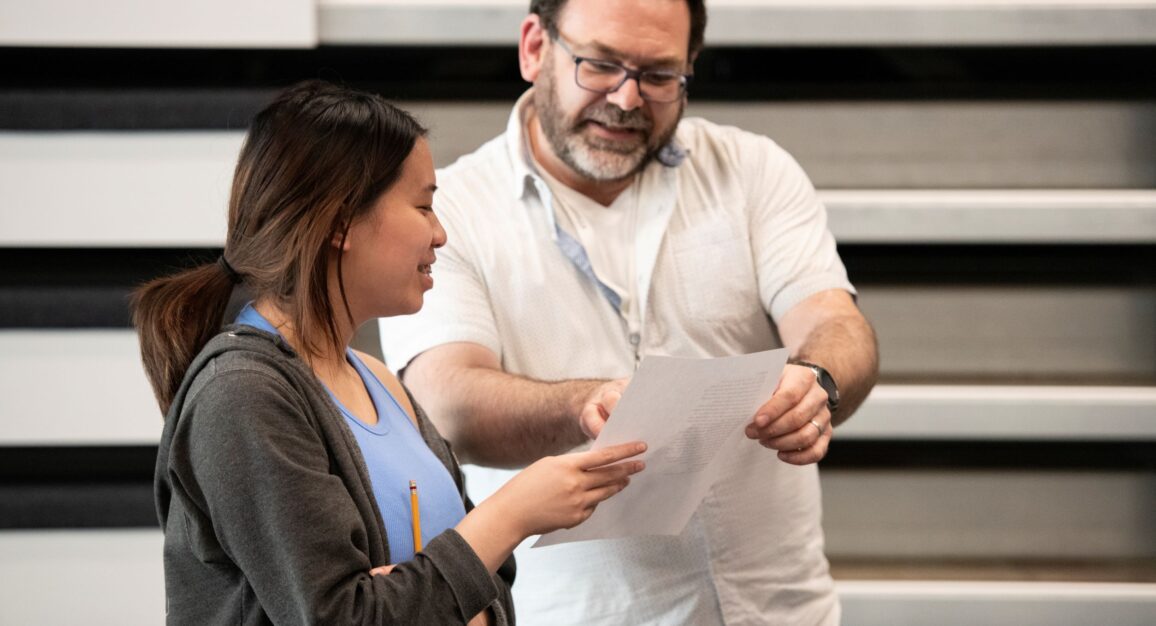Film Programs
Develop on-camera acting skills through exercises, readings, and improvisation, building confidence and self-awareness both on- and off-camera. Students also learn how to prepare as an actor and tackle creative projects, such as how to develop a dynamic character.
Film Acting
Ages 6-8, 9-12, 12-19
GI
Acting for film requires a slightly different skillset than acting for theatre. In this class, students study the fundamentals of acting, such as goals, tactics, beats, and character journey, and then apply them to performing on camera, adding in considerations for angles, frames, and marks. Students also learn how to film a self-tape for auditions, both in front of and behind the camera. Work filmed in class may be shared digitally with family throughout the term.
Music Programs
Students learn to confidently create sound and explore vocal ability to tell a story. As they advance, students work with matching pitch, recognizing musical structure, vocal dynamics, and exploring different genres of music.
Group Voice
Ages 6-8, 9-12
GI
Led by an instructor and live accompanist, students work on technique, vocal stamina, projection, diction, range, and control, as well as their understanding of sheet music and harmony.
Private Voice
Ages 8+
GI
Private singing instruction is the gold standard in learning to sing. Working 1-on-1 with an instructor, students learn the basics of music theory, review the structures and sensations of good singing, practice good vocal hygiene, and more. Some students will be invited to share their work at our year-end Cabaret nights in June.
Musical Theatre Programs
Sing, act, and dance! As participants progress, they incorporate more intricate harmonies, complex dance steps, and advanced acting techniques to further develop their musical theatre artistry. At the end of each session, students present an in-class showcase of their work for family and friends.
Musical Theatre
Ages 6-8, 9-12, 12-19
GI
Students train as a “triple threat” in dance, music, and acting, building technique and complexity over time. Curriculum encourages students to make connections between their physical self, music, and story, and students develop their sense of self through communication and expression via song and dance. As they progress, students understand how elements of musical theatre come together to tell a story, understand stage directions, and build strong objectives and characters. Older students tackle more complex material and explore more specific acting techniques such as the GOTE method.
Theatre Programs
Students explore a variety of age-appropriate acting tools and techniques, with younger students developing imagination, creativity, self-confidence, and empathy in a fun and expressive way. As students progress, they learn to apply specific technique to solo and group scripts, improvisations, and devised work. Teen artists continue to sharpen their instincts to make stronger and more consistent choices and add the broader context of acting through studies of theatrical history.
Acting
Ages 6-8, 9-12, 12-19
GI | SC
Students will study character creation, staging, and story structure, using theatre games and exercises to develop vocal control, awareness of breath and body, and more. As students advance, theatrical methods such as GOTE, Uta Hagen’s 9 Questions, and Eight Efforts are introduced.
Sketch Comedy & Improv
Ages 6-8, 9-12
GI
Yes, and! Through classic improv games and exercises, students develop comedic scenes and scripts as well as skills for life such as teamwork, problem-solving, confidence, and accepting feedback. Curriculum is guided by the principles of Viola Spolin’s “Improvisation for the Theatre” and Del Close’s “Harold” format. Long form, theatre sports, and comedy-based improv are explored at higher levels, once foundations in Spolin-style improvisation are firm.
Intro to Stage Combat
Ages 9-12, 12-19
GI
What do Shakespeare plays and Marvel movies have in common? Stage combat! In this class, students learn basic stance/posture, approaches to consent and safety, safe striking, falling, blocks and parries, grappling, and control. Through structured exercises and play, students work on coordination, balance, strength, endurance, and teamwork to learn how a stage-combat sequence serves to further the development of a story. Students ages 12-19 will have the opportunity to learn swordplay as well as hand-to-hand combat.
Stagecraft
Ages 6-8, 9-12
GI
Learn the secrets of what goes on behind the scenes; how costumes, scenery, lighting and sound all work together with the actors create a production on the stage or the screen. Using age appropriate exercises, hands-on play and experimentation, students develop their understanding of the relationship between materials, design principles, and storytelling. Older students build on foundational skills with specific and more advanced techniques in scenic painting, prop building, lighting design and more.
Voice Acting
Ages 9-12
GI
From cartoons to commercials and radio to video games, voice acting is an integral part of an actor’s tool belt. In this class, students learn microphone technique and studio etiquette, and play with character voices as they explore the world of voice acting and see how to bring a script to life.
